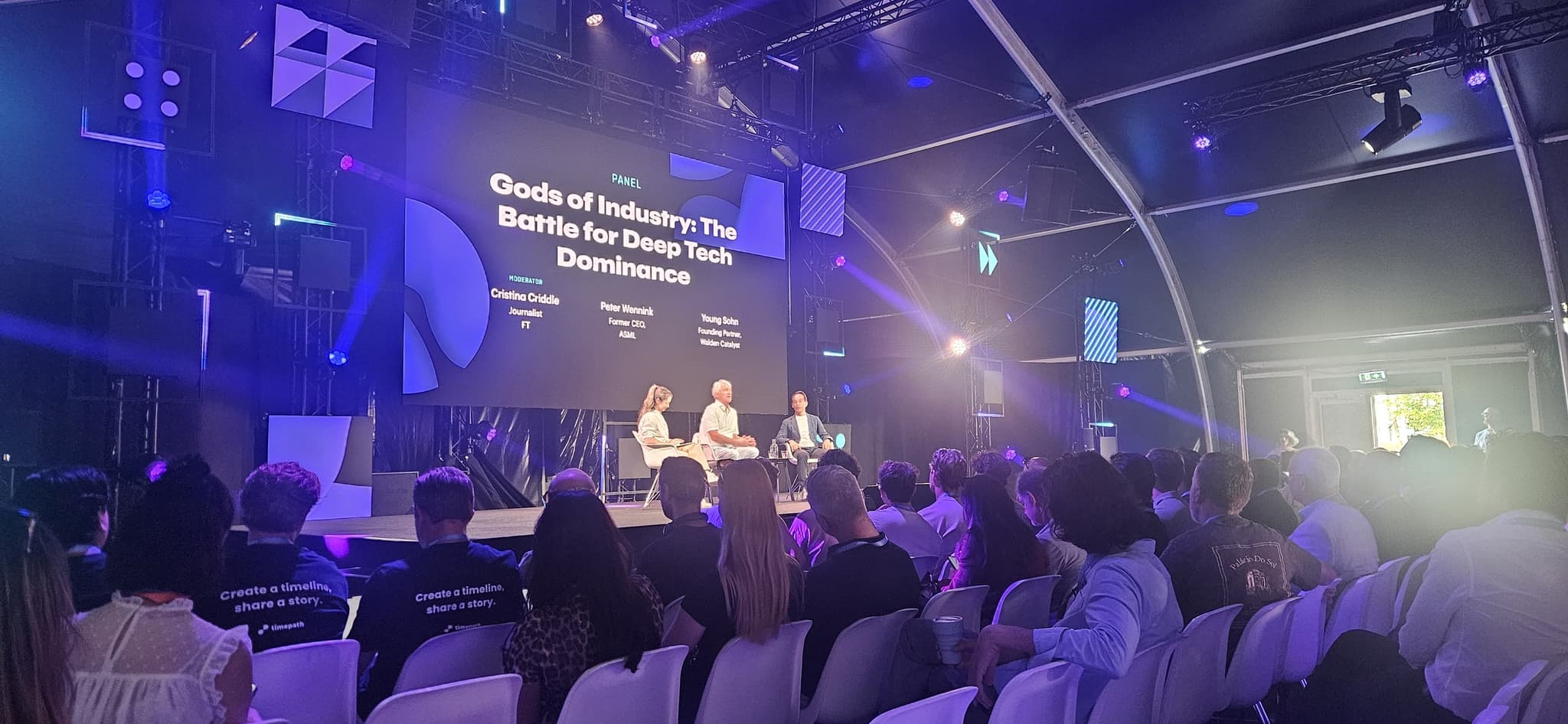'Gods of Industry': how deeptech can win the new Cold War
Who will win the battle for deeptech dominance? At TNW, former ASML chief Peter Wennink and Young Sohn discussed this question.
Published on June 20, 2025

As editor-in-chief, Aafke oversees all content and events but loves writing herself. She makes complex topics accessible and tells the stories behind technology.
Quantum technology, AI hardware, memory systems, and semiconductors - this era is one in which the fundamentals of the digital world have become not only economic, but also geopolitical territory.
On the second day of TNW 2025, former ASML top executive Peter Wennink and Walden Catalyst founder and former Samsung top executive Young Sohn - heralded as ‘The Gods of Industry’ discussed one of today's most pressing questions: who is going to win the battle for deep-tech dominance - and how do we ensure that Europe is not left out? 'Gods of Industry': how deeptech wins the new Cold War
From AI hype to infrastructure crisis
The rise of AI is leading to unprecedented demand for computing power. The big question is: Can we continue to meet the growing demand? According to Young Sohn, former Samsung executive, investor, and founder, the role that data centers play is going to explode. "Data is driving AI. A million GPUs sounds impressive,“ Sohn states, ”but it only accounts for 14 billion dollars worth of chips, and consumes 1.2 gigawatts of energy."
One million GPUs means one million graphics processors - chips specifically designed to perform highly intensive computations, such as those needed in AI training and applications.
And that's just the beginning. Data volumes are doubling every 18 months. New generations of AI models require exponentially more memory, processing capacity, and power. "We will soon be talking about 500 gigawatts for data centers. The infrastructure has to be completely overhauled," Sohn said.
Wennink agrees that the growth curve is inevitable. "The industry can triple to $1.2 trillion by 2045. But then we have to build manufacturing capacity now." ASML is a good example of how Europe can build leading technology itself, provided the right long-term choices are made.
Energy, memory, chips: everything has to be different
In addition to computing power, architecture also poses a significant challenge. Sohn: "We use enormous amounts of energy to hold context in AI systems. That's unsustainable." The solution? Integrating memory into the chip itself, so that data and computing power no longer have to travel from place to place. "The human brain is the inspiration. Our brains contain up to 100 billion neurons and are extremely efficient."
These neurons are highly efficient compared to current computer architectures, especially in terms of power consumption. The human brain uses only about 20 watts (approximately the same as an energy-saving light bulb), while an AI model running on a million GPUs requires many megawatts to gigawatts.
Moreover, neurons work essentially in parallel, making natural systems, such as pattern recognition (facial recognition, speech recognition, intuition), lightning-fast and energy-efficient. Our brains combine storage and processing in the same network (synapses), where conventional computers keep memory and processing separate, and therefore lose a lot of energy in data movement.
A lesson in biology
The panel here is starting to look more and more like a biology lesson, but that is no coincidence. AI research is increasingly focusing on neuromorphic chips and brain-inspired computing systems, which attempt to mimic the brain's workings in terms of both structure and efficiency.
As complex as the above issue is, according to Wennink, there is no reason for pessimism: "The challenge is complex, and that is exactly why we are going to see so much innovation. Those who invest in fundamental deep-tech solutions now will soon be at the forefront." He also emphasizes that innovation rarely arises spontaneously: "The greatest condition for success is cooperation. That is exactly where Europe can excel culturally: sharing risks and rewards."
Geopolitical shock waves as a catalyst
What makes the conversation urgent is the geopolitical undercurrent. Sohn cites global unpredictability, caused in part by “the new mayor in town” - an apparent reference to Donald Trump. “Every government is now by necessity asking itself: how do I survive if the big brother pulls out?”
The officially retired Wennink notices a growing sense of urgency among companies, organizations, and governments. "We can no longer afford to think only of ourselves. This unpredictability is forcing a rethink. A few years ago, I called the Netherlands ‘fat, dumb, and happy.' Those days are now over - Trump may well be the best thing that has happened to Europe. It has awakened people and governments."
According to Wennink, this is visible in Dutch pension funds, among others. "There is over €1,500 billion there, more than 60% of which is invested outside the Netherlands and Europe. Those funds are now being questioned: why doesn't that money flow back into their ecosystem?" A positive development, according to the former ASML executive. "The key question remains: how then? The world is changing, and Europe will have to find a solution. "
Deeptech is not a borderline case - but a matter of courage
Sohn concludes with a lesson from practice. Of the 600 deeptech companies he has invested in, only 8% have reached the scale-up phase. "You need both the best technology and the best customers. Deeptech is binary: you either win or you fail." Wennink adds: "It's not just about technology. It's about industrialization. About the real value for end users. This arises in ecosystems where start-ups, universities, manufacturers, and investors collaborate. Europe knows the tradition of cooperation and proven success formulas."
